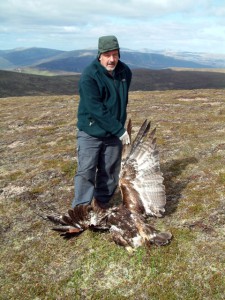
BIRDS of prey continue to be slaughtered because Scots landowners and police undermine laws meant to protect them, a former wildlife crime investigator claims.
Dave Dick says he quit as head investigator for the RSPB in Scotland because he was “sick to the back teeth” of gamekeepers getting away with killing raptors.
Dick’s explosive allegations, based on a 25-year career, include landowners committing perjury and police tipping off gamekeepers they were about to visit.
Despite an act of 1981 which allows six months in prison or a £5,000 fine for killing a wild bird, 29 raptors were illegally poisoned in 2010 alone.
The number of breeding pairs of golden eagles has dwindled to 442 while goshawks are down to 410.
He said: “I am one of the few people who are willing to stick their heads above the parapet.
“When you try and explain it to people who haven’t been involved they think you’re exaggerating.”
The grouse shooting industry in Scotland alone is worth £240m a year and raptors often kill the game birds.
Dick, who quit his RSPB job in 2006, has written a book which details how gamekeepers regularly escape prosecution for trapping, shooting or poisoning rare birds.
He claims that in one case a major landowner in the south-west of Scotland lied at the trial of a gamekeeper.
Dick called in police after discovering numerous traps set within a few hundred metres of the landowner’s home.
He said: “The owner of the estate turned up in court. He said ‘I was there and everything was fine.’
“He was introduced as being whiter than white. He just lied through his teeth in court.
“I knew this guy lied because I had seen the traps myself. He would have been on all the shoots, it was within 300 metres of his house.
“I don’t think nobility describes these people.”
Dick claims investigations and prosecutions could also be frustrated because police were too close to gamekeepers.
He said: “When I gave [police] the name of the local gamekeeper, I was told, ‘Oh he’s a nice bloke, it won’t be him,’ and that was the end of that case.
In the book, Dick writes: “When trying to follow up a blatant case of peregrine persecution (traps and shooting, eyewitness evidence) in the Borders in May 1986, I was told by a policeman in the first police office I visited to go to the next village office because his colleagues were too friendly with that keeper.”
Dick, from Moffat, Dumfries and Galloway, said the police would often discreetly inform gamekeepers the RSPB were onto them.
“A very good friend of mine who used to sell gun dogs got a call from the police saying someone has found your traps, we’re coming round in a couple of hours, clear them up.”
Dick claims that, in some cases, even members of the judiciary are failing to bring the full weight of the law to bear.
In one case described in the book, a gamekeeper was in court for setting a trap to catch a goshawk.
Dick said: “We then watched the Fiscal stand up and begin to outline the prosecution case and charges. The sheriff quickly interrupted him. ‘What? You mean I can’t kill these birds if they are taking my pheasants?’
“The sheriff then merely admonished the head keeper – giving him a warning but no financial or other penalty – and we left the court, stunned and angry.
“A man had admitted intentionally catching a goshawk, a Schedule 1 rarity and could have faced a fine of up to £5,000.
“A law whose very existence was the result of perhaps a century of struggle by conservationists had just been trampled on.”
Dick added: “I’ve had 25 years of this crap! I was sick to the back teeth of it.
“That’s why I left. I wasn’t being allowed to do what the public wanted me to do.”
A spokesman for animal charity OneKind, which monitors wildlife crime, backed Dick.
He said: “In our experiences wildlife crime is not given the weight it should be given, and it’s not pursued as vigorously as we would like it to be.”
Speaking about new laws on ‘vicarious liability’, where landowners could take responsibility for crimes on their estates, he added: “These measures are only as good as the enforcement.”
An RSPB spokesman praised Dick’s “important contribution” to combating wildlife crime.
He said: “We will be pressing for the resources devoted to wildlife crime enforcement to be maintained, and increased where possible”.
The Scottish Gamekeepers Association (SGA) said statistics show wildlife crime is on the decline, and they are informing their members of the law around wildlife crime.
A spokesman said: “As an active member of Partnership Against Wildlife Crime, and as an organisation, the SGA takes its responsibilities in educating its membership and supporters about the law very seriously.”

